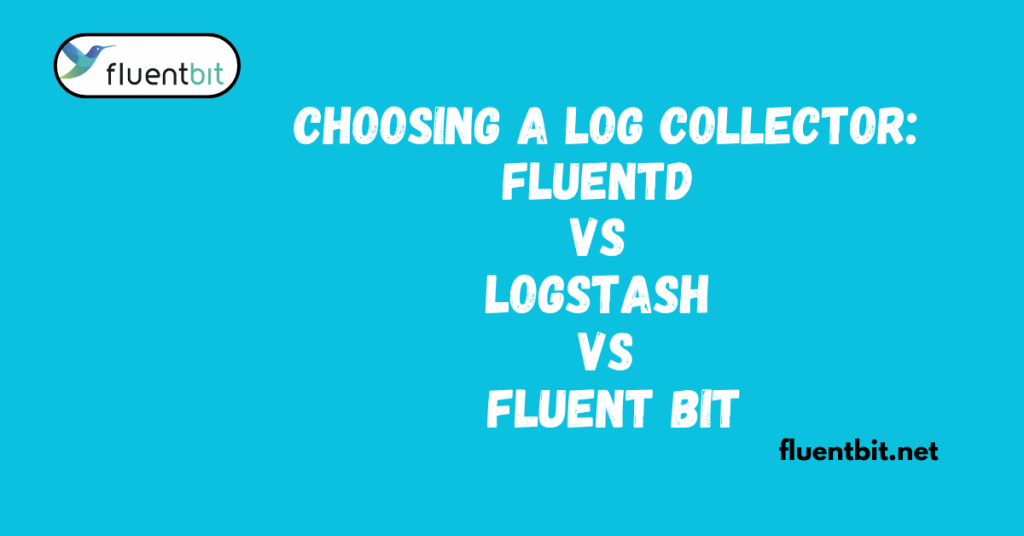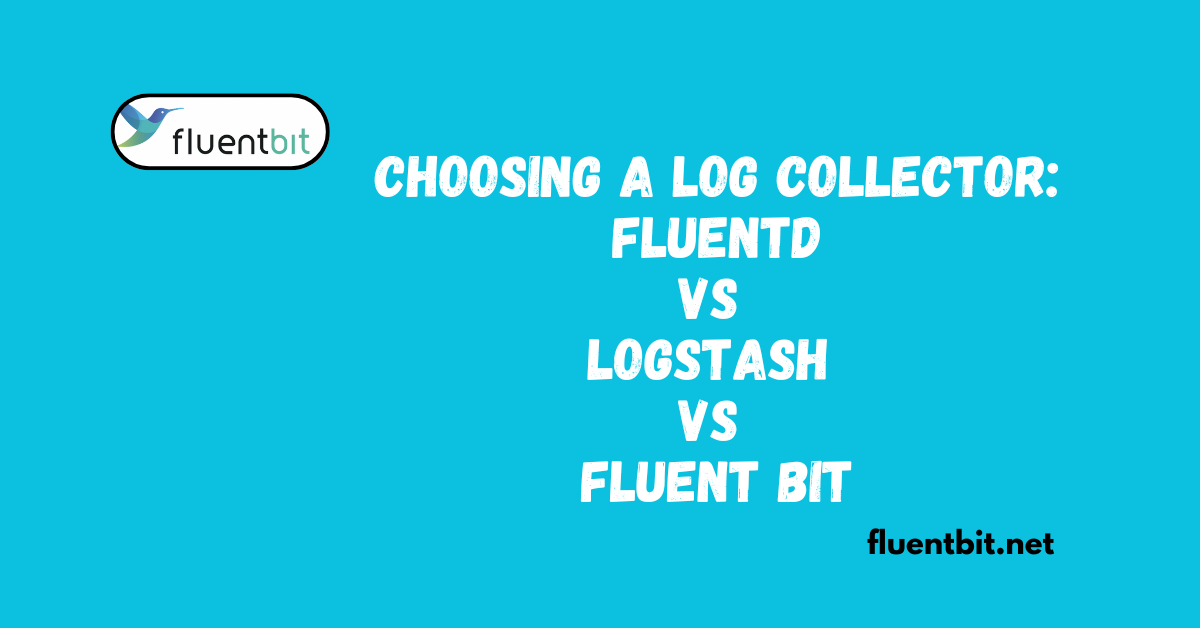Table of Contents
ToggleIntroduction
In the world of log management, Choosing a Log Collector: Fluentd vs Logstash vs Fluent Bit. These tools act as workhorses, gathering log data from various sources and forwarding them for analysis. Three popular options are Fluentd, Logstash, and Fluent Bit.
Each has its strengths, and the ideal choice depends on your specific needs. This guide will break down the key differences between Fluentd, Logstash, and Fluent Bit to help you make an informed decision.
Factors to Consider When Choosing a Log Collector:Fluentd vs Logstash vs Fluent Bit: Deployment Size and Existing Infrastructure
There are two key factors to consider when choosing a log collector: deployment size and existing infrastructure. Let’s delve deeper into each:
1. Deployment Size:
- Small Applications: For applications with a limited number of log sources and relatively low log volume, lightweight options are ideal. They consume fewer resources and offer a simpler setup. Here are two strong contenders:
- Fluent Bit: Written in C, Fluent Bit boasts high performance and low memory footprint. It’s perfect for resource-constrained environments or situations where you only need basic log collection and forwarding.
- Elastic Beats: This collection of lightweight data shippers by Elastic offers pre-built modules for various sources like system logs, Docker containers, and Kubernetes. Beats are easy to deploy and integrate seamlessly with Elasticsearch and Kibana.
- Large Applications: For larger deployments with significant log volume and complex processing needs, consider more robust options:
- Logstash: As part of the ELK Stack, Logstash offers a rich plugin ecosystem for advanced log parsing, filtering, and enrichment. It can handle high volumes and complex processing tasks, making it well-suited for large deployments.
- Fluentd: While not as lightweight as FluentBit, Fluentd offers a good balance between resource consumption and processing power. It supports a wide range of plugins and integrations, making it a versatile choice for a variety of deployment sizes.
2. Existing Infrastructure:
- Elasticsearch & Kibana (ELK Stack): If you’re already using Elasticsearch and Kibana for log storage and analysis, Logstash offers a natural fit. Tight integration with the ELK stack simplifies data flow and streamlines log management.
Factors to Consider When Choosing a Log Collector: Resource Constraints and Complexity
In addition to deployment size and existing infrastructure, two other important factors to consider when choosing a log collector are resource constraints and complexity:
1. Resource Constraints:
- Memory Limitations: If you’re working in an environment with limited memory resources, choosing a log collector with a smaller memory footprint is crucial. Here’s a breakdown of the options:
- Fluentd and Fluent Bit: Both are written in C, making them memory-efficient options. Fluent Bit, in particular, excels in low-memory environments due to its exceptionally small footprint.
- Logstash: Written in Java, Logstash has a larger memory footprint compared to Fluentd and Fluent Bit. This can be a disadvantage if you have limited memory available.
2. Complexity:
- Simpler Setups: For straightforward log collection and forwarding with minimal processing requirements, simpler tools might be preferable.
- Fluentd and Fluent Bit: Both offer relatively easy setup processes and configurations. Fluent Bit, with its focus on simplicity, is ideal for situations where you need a log collector that just works without a lot of overhead.
- Logstash: While still configurable, Logstash’s extensive plugin ecosystem and potential for complex transformations can add complexity to the setup process.
- Advanced Transformations: If you need to perform complex log parsing, filtering, and enrichment, a more powerful tool might be necessary.
- Logstash: Logstash shines in this area. Its rich plugin ecosystem provides a vast array of options for manipulating and transforming logs. You can parse complex log formats, filter unwanted data, and enrich logs with additional context before forwarding them for analysis.
- Fluentd and Fluent Bit: While both offer some filtering and transformation capabilities, they are not as powerful as Logstash in this regard. For basic transformations, they might suffice, but for complex manipulation, Logstash is the better choice.

Log Collector Breakdown: A Closer Look at Fluentd, Logstash, and Fluent Bit
Here’s a detailed breakdown of the three popular log collectors, highlighting their strengths and weaknesses:
Fluentd:
- Strengths:
- Efficiency and Lightweight: Written in C, Fluentd boasts a smaller footprint compared to Logstash. It’s a good choice for resource-constrained environments.
- Docker Friendly: Fluentd offers a built-in Docker logging driver and parser, making it a natural fit for collecting logs from containerized applications.
- Weaknesses:
- Complexity for Advanced Processing: While offering some filtering and transformation capabilities, Fluentd can become cumbersome for complex log manipulation tasks. Logstash provides a richer set of tools for advanced processing.
Logstash:
- Strengths:
- Powerful Processing: Logstash excels in advanced log processing. Its extensive plugin ecosystem offers a wide range of filtering, parsing, and enrichment options.
- ELK Stack Integration: Logstash integrates seamlessly with Elasticsearch and Kibana, the core components of the ELK Stack for log storage and analysis. This tight integration simplifies data flow within the ELK environment.
- Weaknesses:
- Resource Usage: Written in Java, Logstash has a larger memory footprint compared to Fluentd and Fluent Bit. This can be a disadvantage if you have limited resources.
Fluent Bit:
- Strengths:
- Lightweight Champion: Extremely lightweight and written in C, Fluent Bit is ideal for resource-constrained environments with limited memory and processing power.
- Focus on Collection and Forwarding: Fluent Bit excels at efficiently collecting and forwarding logs from various sources. It’s a good choice for simple setups where basic log collection is the primary goal.
- Weaknesses:
- Limited Processing: While offering some basic filtering options, Fluent Bit lacks the extensive processing capabilities of Logstash. It’s not suitable for complex log manipulation tasks.
Conclusion:
Choosing the right log collector is crucial for effective log management. This guide has explored three popular options – Fluentd, Logstash, and Fluent Bit – highlighting their strengths and weaknesses in terms of deployment size, existing infrastructure, resource constraints, and complexity.
Ultimately, the best choice depends on your specific needs. Consider factors like the size and complexity of your deployment, your existing infrastructure, and your resource limitations. If you prioritize efficiency and resource usage, Fluentd or Fluent Bit might be ideal. For powerful log processing and seamless ELK Stack integration, Logstash shines.
Remember, this is just the first step. Don’t hesitate to delve deeper into the documentation and explore each tool to find the perfect fit for your log collector management needs. By choosing the right log collector, you can ensure that your valuable log data is collected, processed, and analyzed effectively, providing valuable insights into the health and performance of your systems.
FAQs
What are Fluentd, Logstash, and Fluent Bit?
Fluentd, Logstash, and Fluent Bit are all open-source log collectors used for collecting, processing, and forwarding log data from various sources in a unified manner. They serve as crucial components in log management and analysis pipelines.
Can I use Fluentd, Logstash, and Fluent Bit together in a single logging pipeline?
Yes, you can use combinations of Fluentd, Logstash, and Fluent Bit in your logging architecture based on your specific requirements. For instance, you might use Fluent Bit for lightweight log collection at the edge, Fluentd for centralized log processing and enrichment, and Logstash for specific data transformations or legacy system integration.
Are there any notable differences in configuration and ease of use among Fluentd, Logstash, and Fluent Bit?
Fluentd and Logstash typically have more comprehensive configuration options and may require more upfront configuration effort due to their feature-rich nature. Fluent Bit, being lightweight, generally has simpler configurations and is easier to set up and deploy, especially in containerized environments.
Which log collector is more suitable for cloud-native environments like Kubernetes?
Fluentd and Fluent Bit are both popular choices for cloud-native environments due to their lightweight nature and native support for containerized deployments. Fluent Bit, in particular, is well-suited for Kubernetes environments due to its minimal resource requirements and efficient log collection capabilities.
How do I choose the right log collector for my project?
Evaluate your specific requirements, including scalability, performance, resource constraints, compatibility, and ecosystem support. Conduct performance tests and consider factors such as ease of integration and maintenance. Additionally, seek feedback from the community or other users who have similar use cases to make an informed decision.
Latest Post:
- Best Practices for Fluent Bit Output Matching in Complex Pipelines
- Setting Up Fluent Bit with Open Telemetry for Unified Observability
- Fluent Bit vs Fluentd: Choosing the Right Tool for OpenSearch Logging
- How to Use fluent-plugin-opensearch for Fluentd Pipelines
- Is Ansys Fluent Better for Complex Fluid Flow Simulations?












